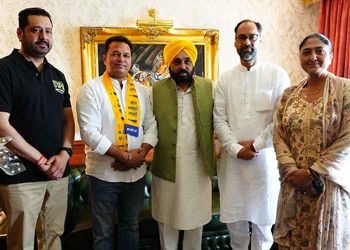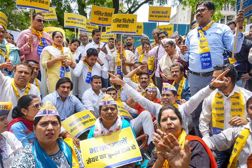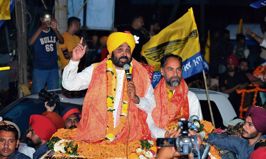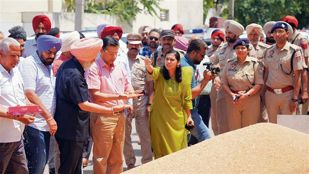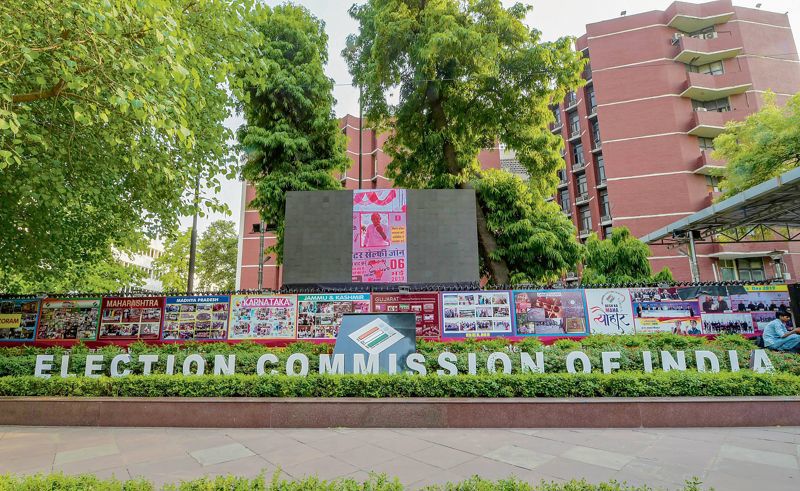
UNDER SCRUTINY: The SBI, after much dilly-dallying, submitted electoral bond details to the ECI, which uploaded them on its website. PTI
Aunindyo Chakravarty
Senior Economic Analyst
The Tribune Debate: Electoral Funding
IN 2017, then Finance Minister Arun Jaitley announced a new way for firms and individuals to fund political parties. Anyone could buy an electoral bond from a bank and instruct it to send it to their party of choice. The bond purchaser would remain anonymous. The political party would only get the paper, be able to encash it, but never know who gave the money. This, according to the government, would have ensured that netas — especially when in power — couldn’t exchange favours for money. Of course, this assumes that every political donor in India is like that silent admirer of yours, who sends you gifts without revealing who they are (no, never happened to me).
This is an inherent weakness of electoral democracies — money flows to the winner, who uses that money to win again.
Understandably, the Opposition didn’t buy this argument. The Congress promised to get rid of electoral bonds if it won the 2019 elections, but quietly continued to take the money after losing the polls. The CPM was the only party which refused to take funds through the electoral bond route — not that corporate donors were lining up in the hundreds to give them money.
Now that the Supreme Court has declared electoral bonds unconstitutional and asked the Election Commission to publish details of every donor, a lot of unsavoury details are coming out. For instance, many donors have given more money than their company’s net worth. Some firms which have been raided by the Enforcement Directorate (ED) are among the biggest donors. Most importantly, political parties and donors have admitted that they knew each other’s identity, busting the myth that electoral bonds are anonymous.
Since the BJP has got roughly as much money through electoral bonds as all other parties combined, it has become open season for Opposition parties to take potshots at the government. Social media has been flooded with allegations of government agencies being used to extort business houses. While this makes for great political rhetoric, it doesn’t amount to much more than that. That is because electoral bonds make up only a fraction of what political parties spend on elections.
Take the 2019 Lok Sabha elections. As of now, we know that the BJP encashed Rs 1,771 crore worth of electoral bonds ahead of the 2019 elections. But how much did it spend on its campaign? According to estimates made by the Centre for Media Studies (CMS) political parties spent Rs 55,000-60,000 crore in 2019. Out of this, CMS estimated that the BJP spent 45 per cent of this amount. That works out to about Rs 25,000-27,000 crore spent by the BJP alone on the 2019 election campaign. That means, just 7 per cent of the BJP’s total expenditure was funded by electoral bonds.
Between March 2018 — when electoral bonds were first launched — and January 2024, parties redeemed bonds worth nearly Rs 16,500 crore. During this period, we have had one Lok Sabha election and 36 Assembly elections. Adjusting for inflation since CMS first calculated the cost of the 2019 elections, one can safely assume that at least Rs 1.2-1.5 lakh crore have been spent on these 37 elections (including the last Lok Sabha polls). Electoral bonds would have contributed just 11-13 per cent of the total poll spending. That is just one-eighth of what political parties spent on their campaigns.
It is worth mentioning that when the CMS calculated how much the 2019 elections cost, it kept out all expenditure which had been clearly undertaken with the elections in mind, just before the model code of conduct came into effect. If those had been included, the number would have been much higher. In fact, political parties don’t just spend during elections, they have to spend throughout the year to keep their electoral machinery working on the ground. All of this costs money, even if it simply means paying for tea and biscuits or fuel bills.
Of course, electoral bonds are not the only ‘official’ route through which political parties get money. Two other sources are money given by electoral trusts and direct donations. Between 2018 and 2023, the BJP got about Rs 4,500 crore through these two routes, over and above what it received through electoral bonds. Even if you add them up, it will still be a minuscule amount compared to what the party and its candidates would have spent on the national and state elections.
Speak to any politician who has fought a major election and they will tell you that political funding actually works through a much more decentralised, and informal, process. The bulk of the money is given indirectly to candidates through various fronts. Payoffs take place at the ground level to local power brokers. Front organisations, such as defunct shell companies and phony NGOs, finance district level leaders, donate money to a neta’s pet project, and make cash payments for electoral expenses. A mid-level entrepreneur with local interests might provide a fleet of cars to a candidate during their campaign, another might pay for the meals given to party workers.
It is inevitable that such money would always go to the party in power, or a party which has the potential to usurp power. This is an inherent weakness of electoral democracies — money flows to the winner, who uses that money to win again. There is a justification in that as well. If a party has popular support, big donors are also likely to be amongst its supporters. In a free society no one can be forced to finance political entities they oppose. At best, there can be strict controls on expenditure so that there is a level playing field for all political parties.
However, even if that happens, the game would still be unequal. In today’s world, the party which controls the message is most likely to win elections. That is where corporate control of news media comes into the picture. Even if laws banned corporates from funding parties, they would still determine electoral outcomes, thanks to their ability to influence the media, mould public discourse and manufacture consent.
Join Whatsapp Channel of The Tribune for latest updates.
























